Charles E W Bean, Diaries, AWM38 3DRL 606/262/1 - 1916 - 1934 - Part 4
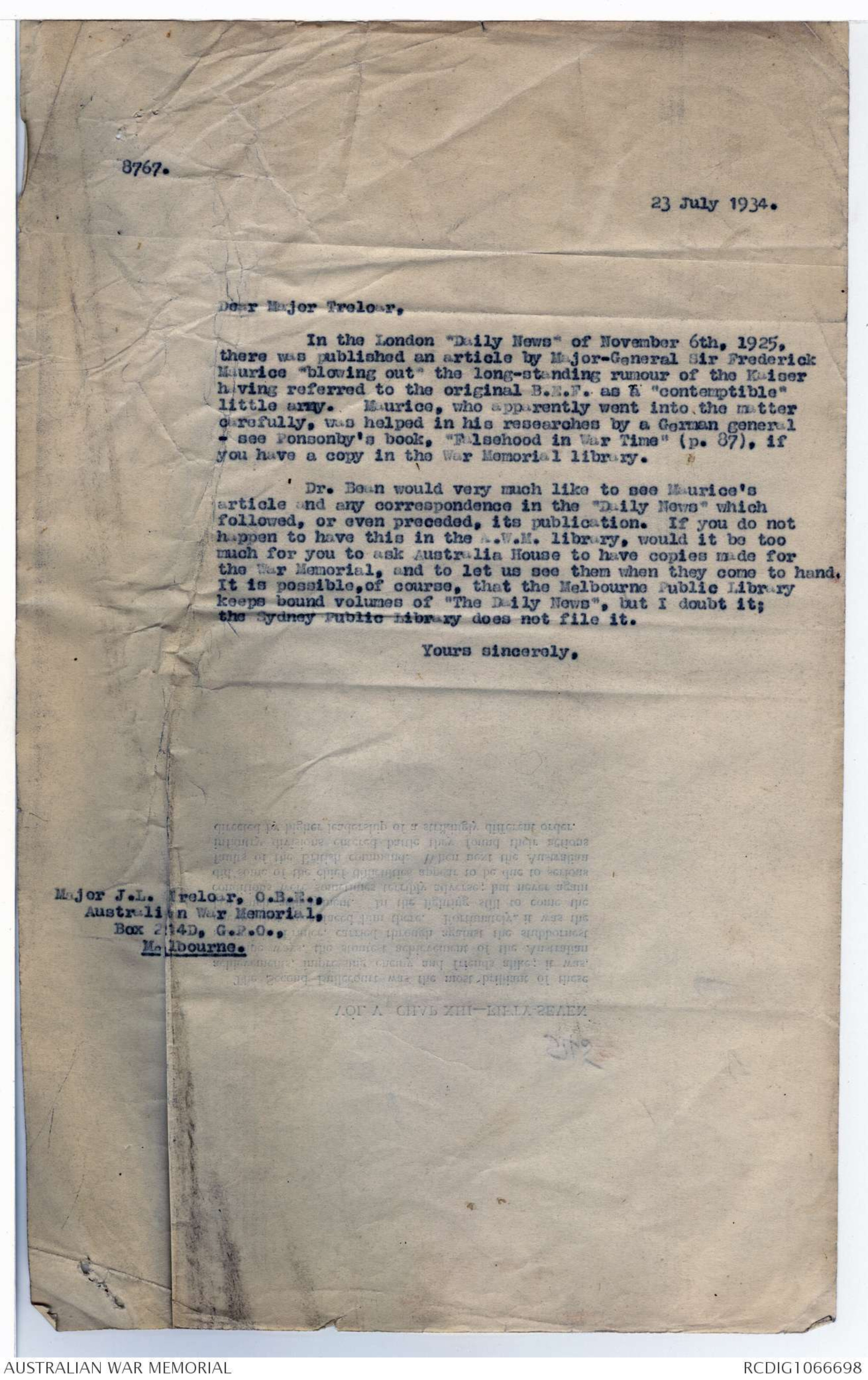
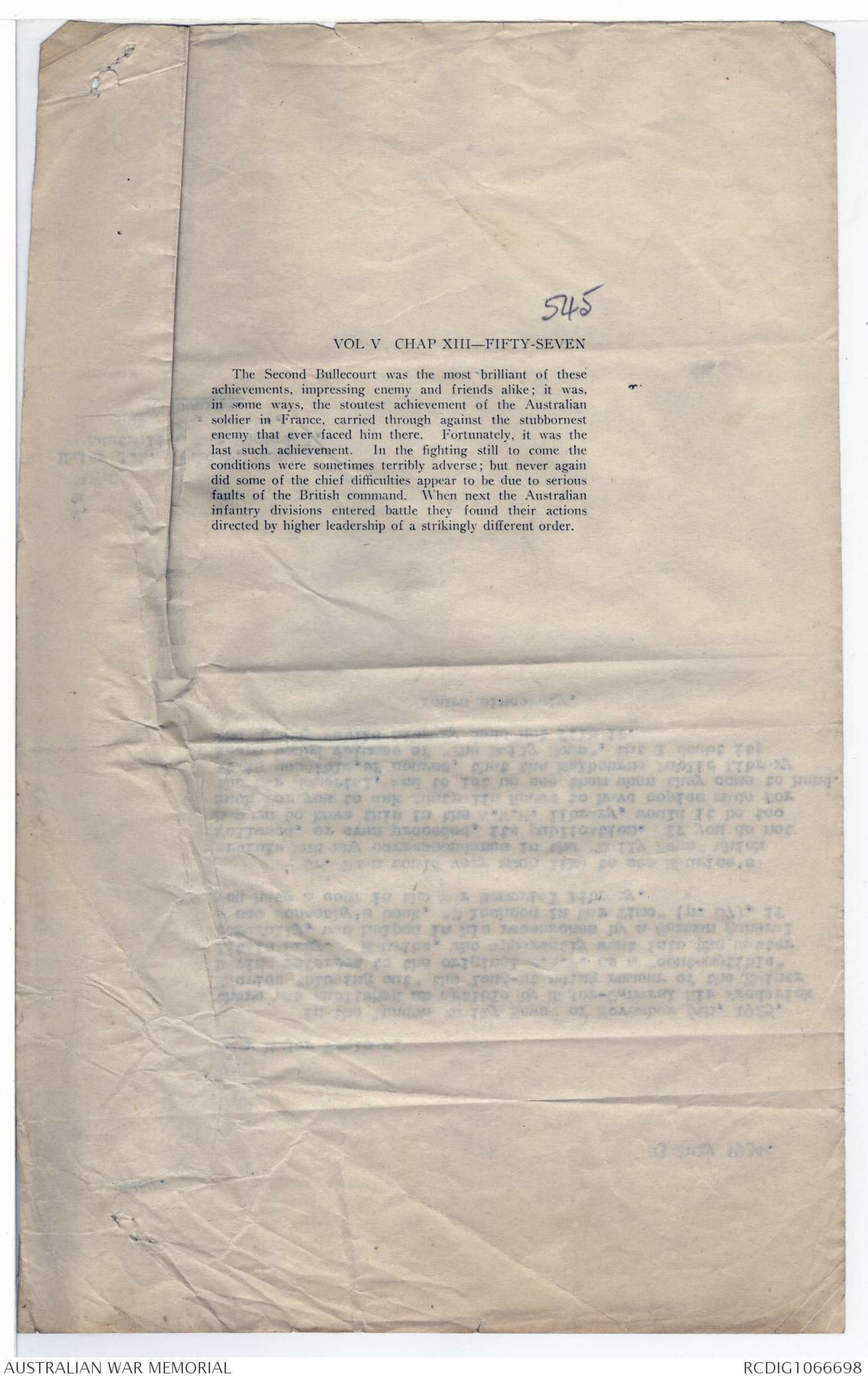
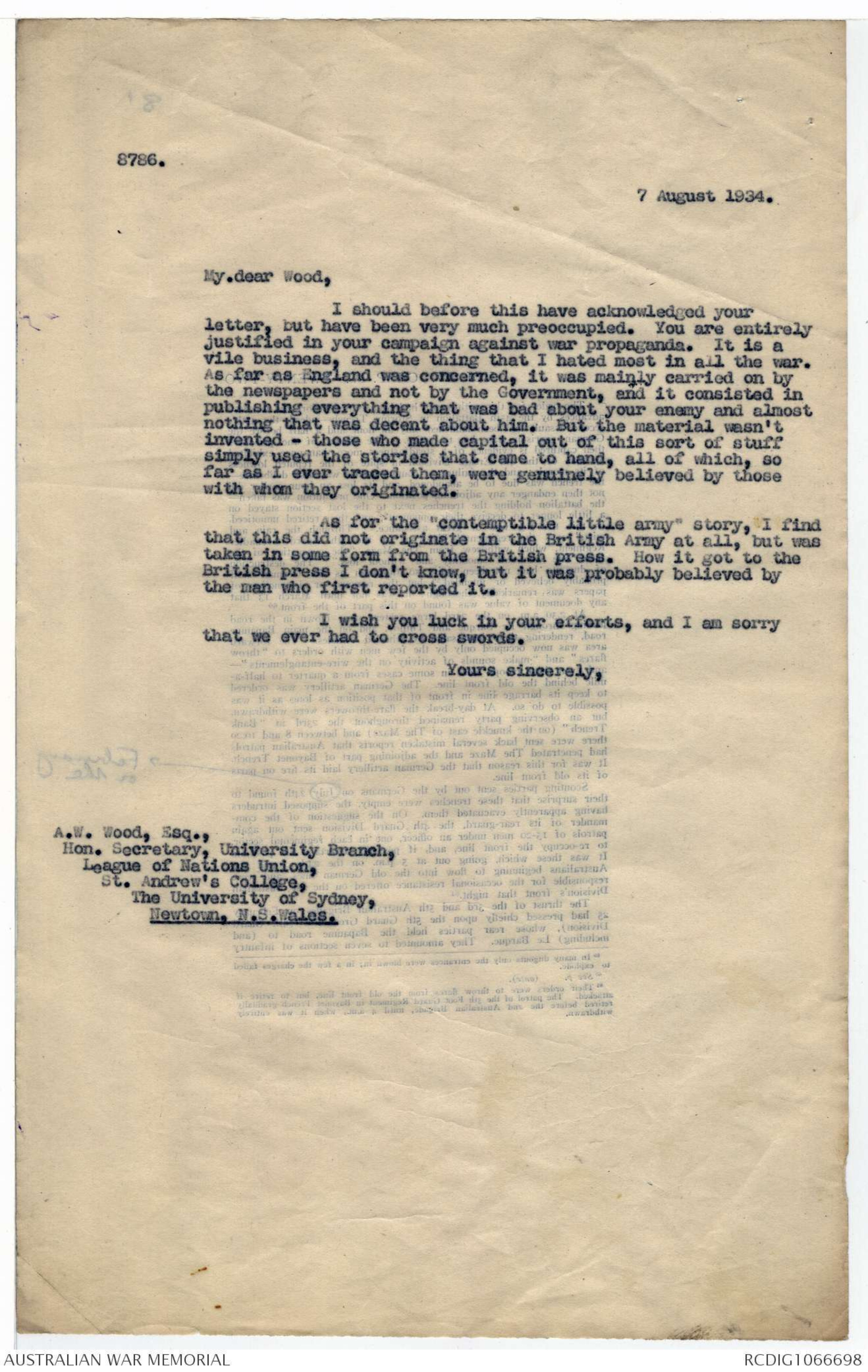
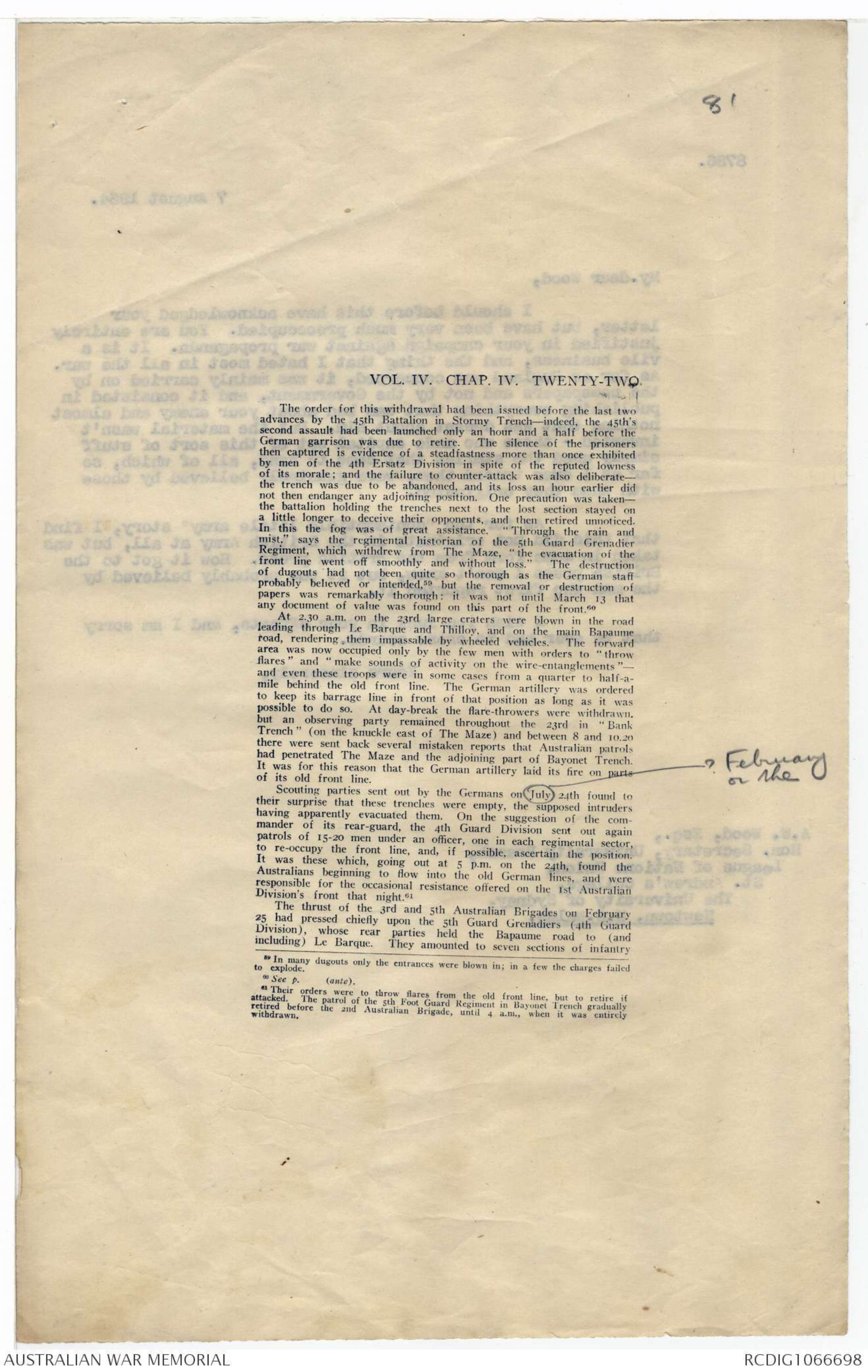
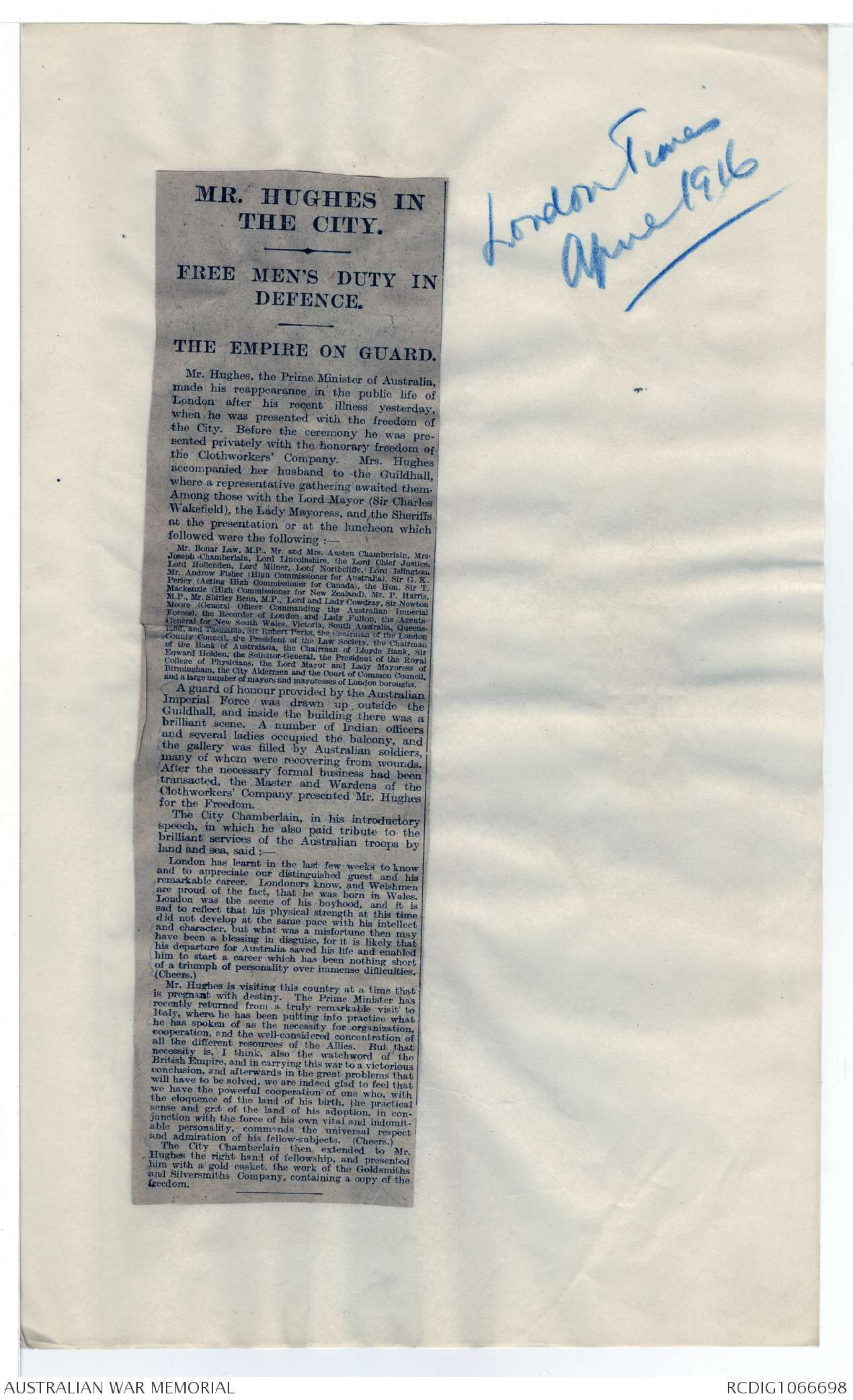
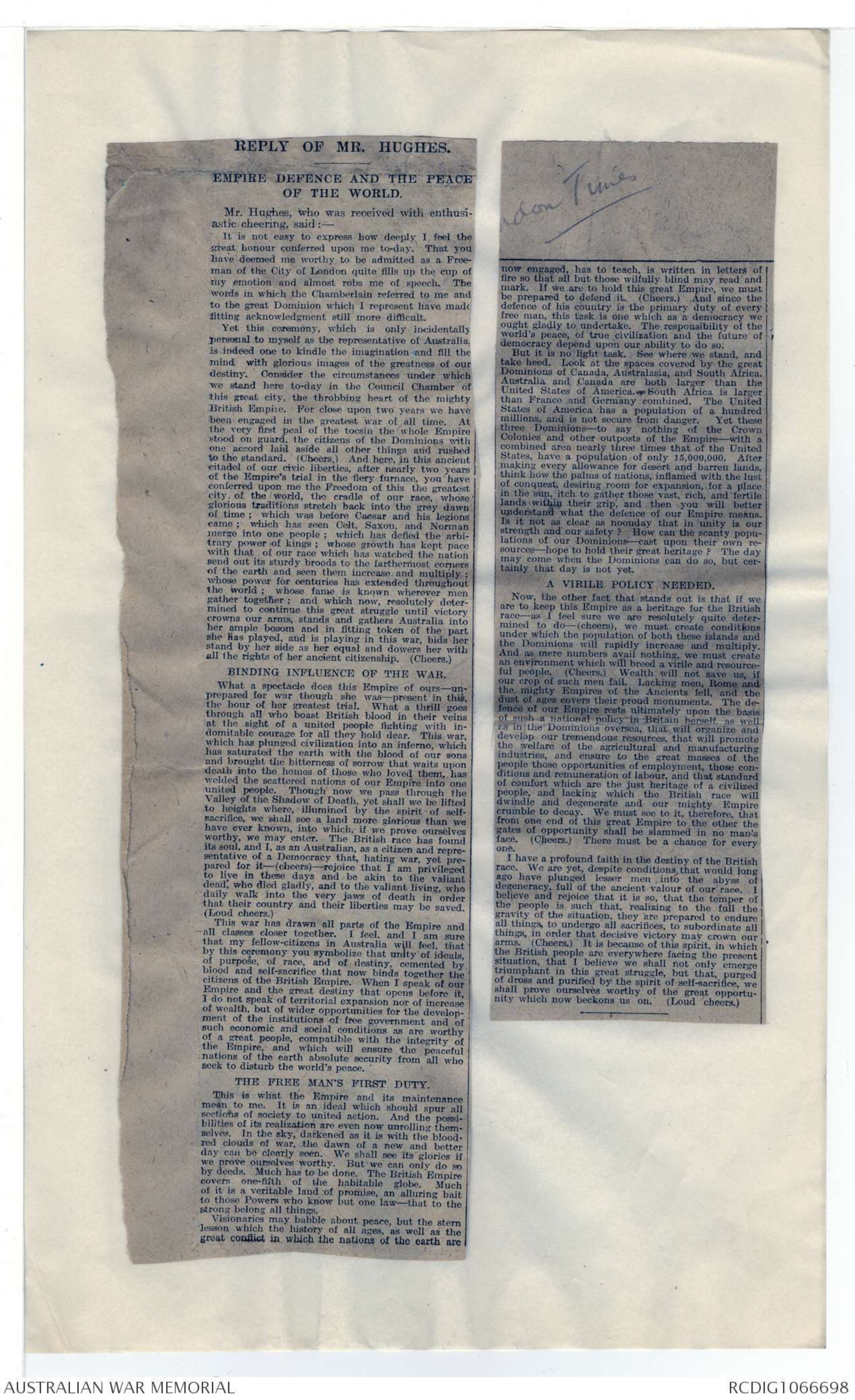
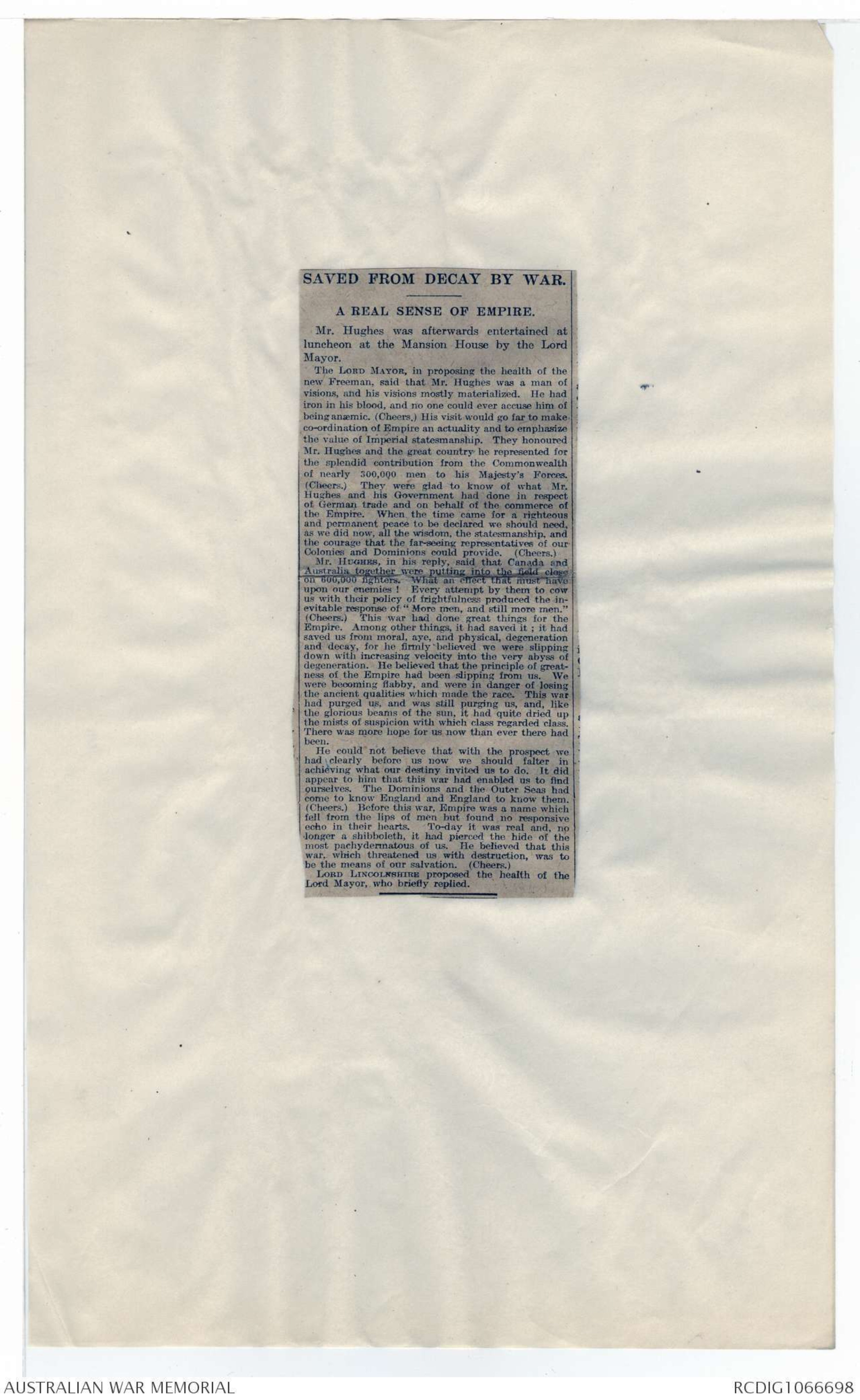
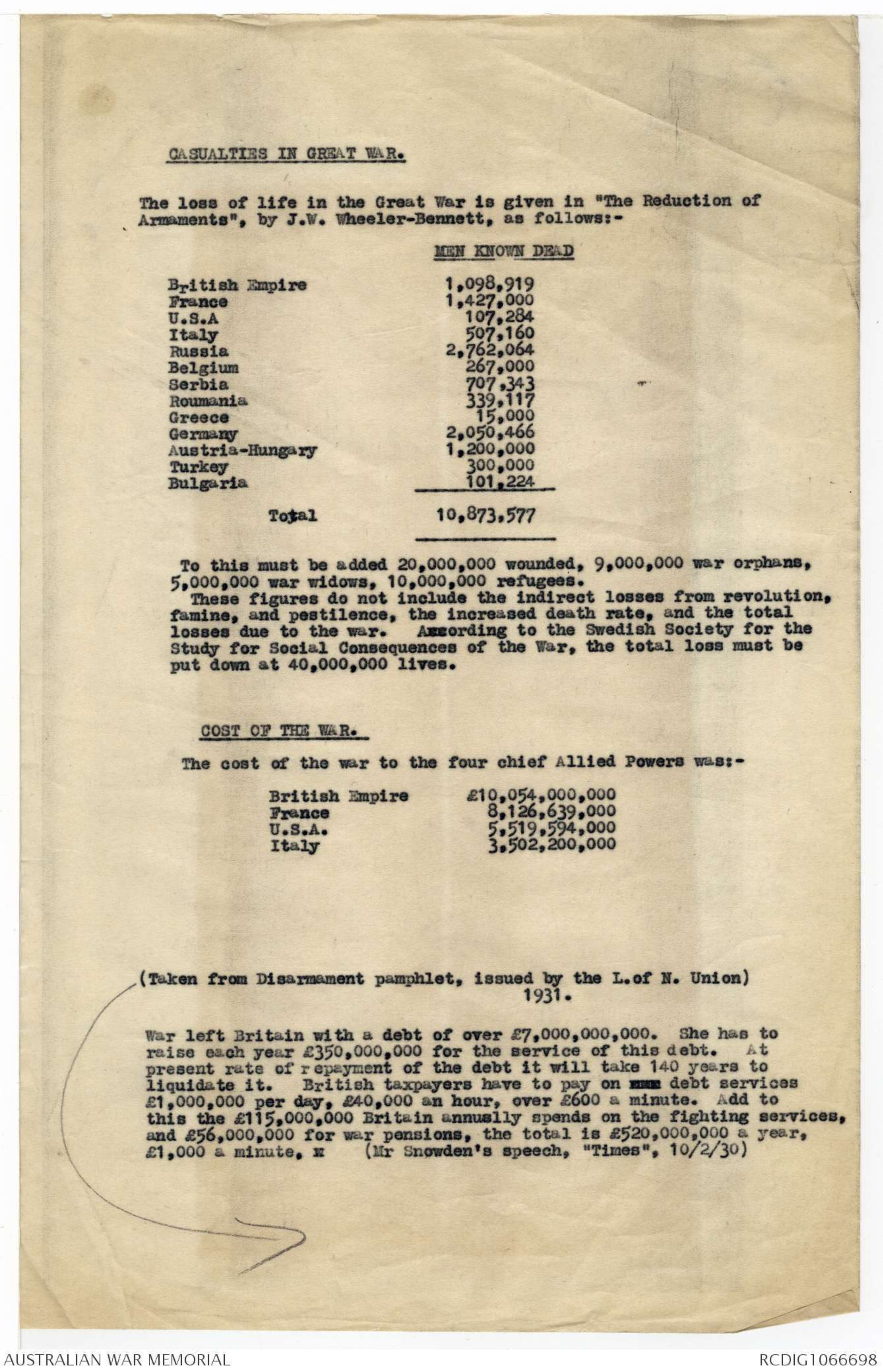
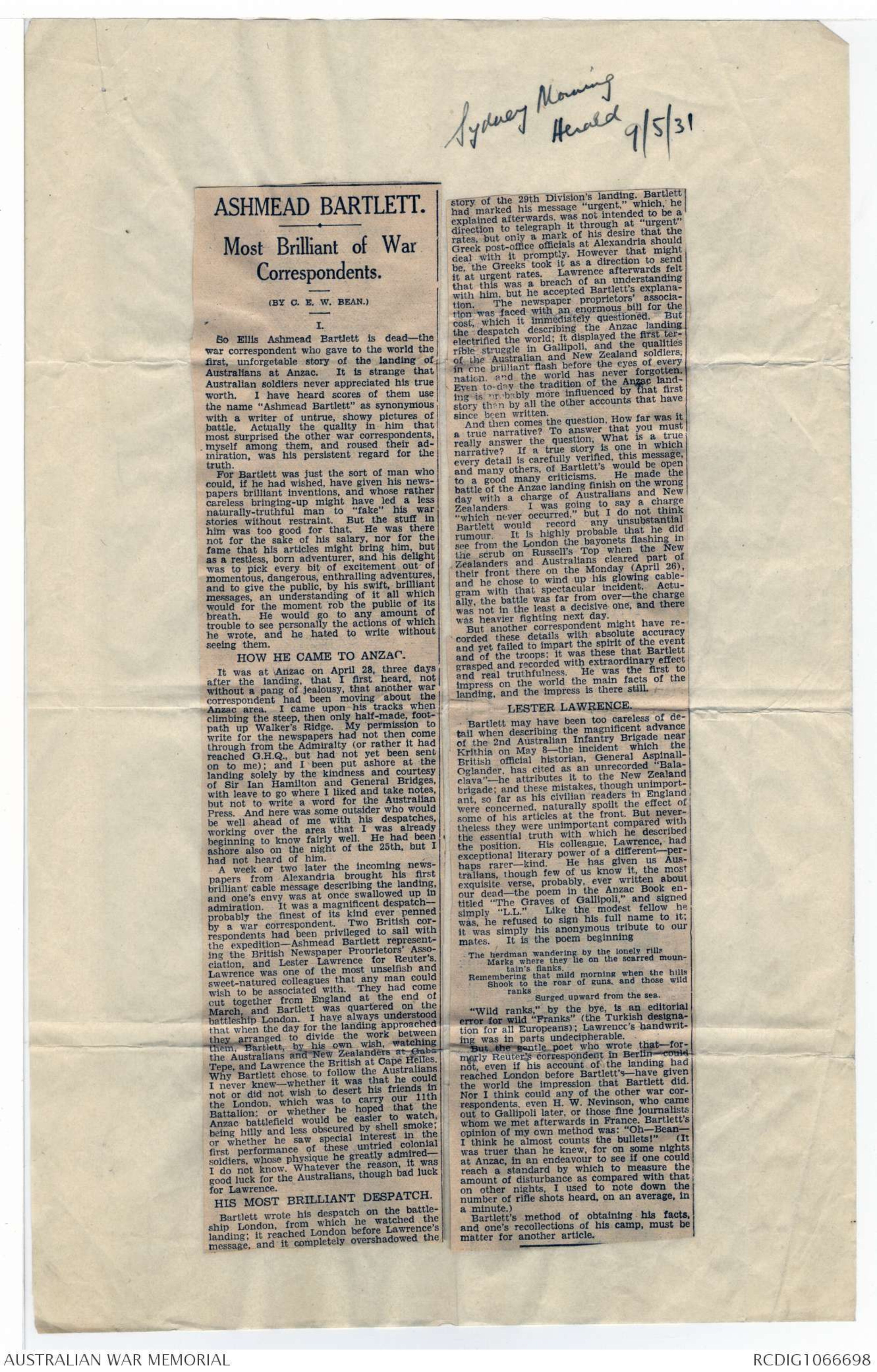
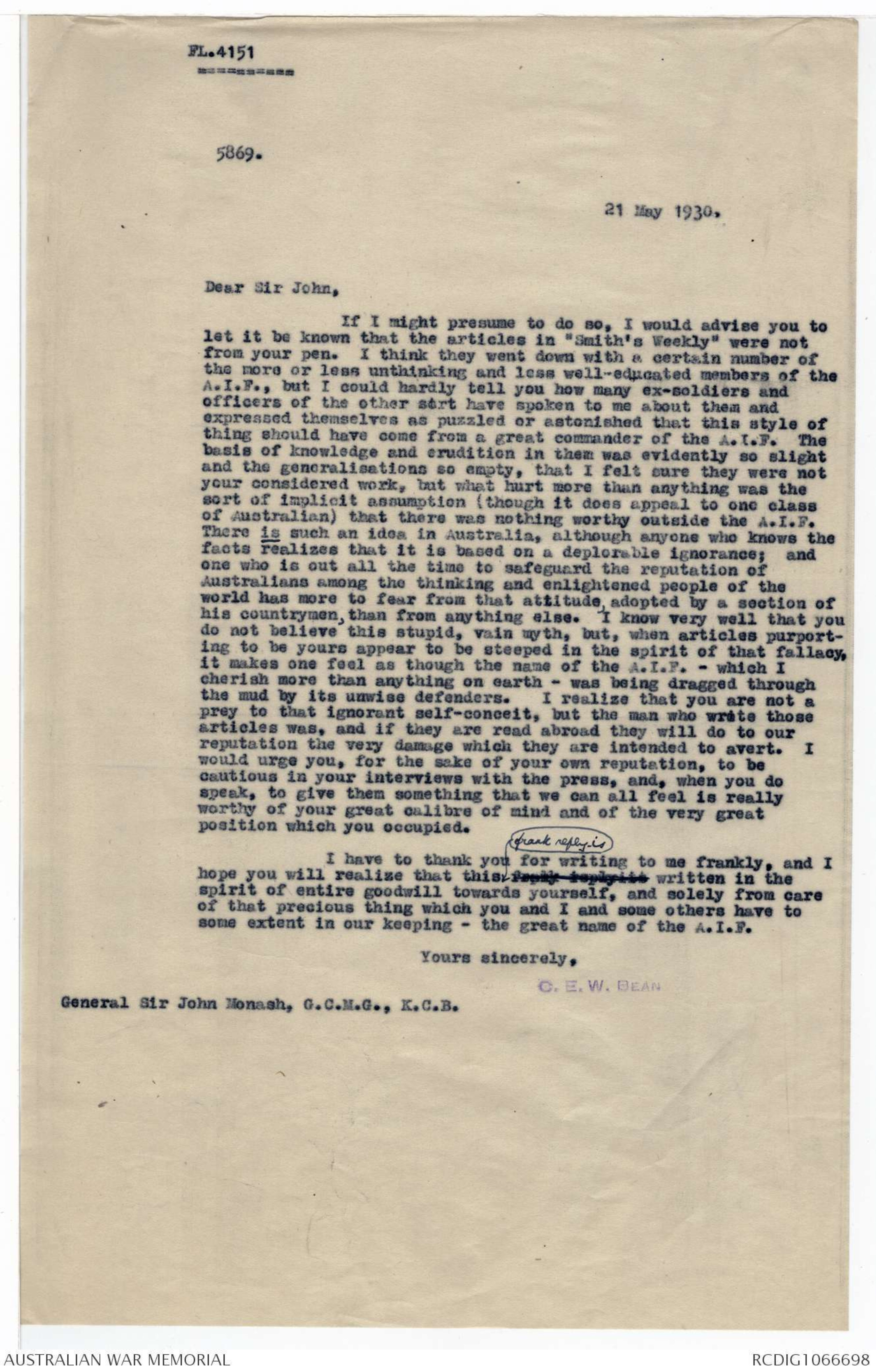
8767.
23 July 1934.
Dear Major Treloar,
In the London "Daily News" of November 6th, 1925,
there was published an article by Major-General Sir Frederick
Maurice "blowing out" the long-standing rumour of the Kaiser
having referred to the original B.E.F.as a "contemptible"
little army. Maurice, who apparently went into the matter
carefully, was helped in his researches by a German general
- see Ponsonby's book, "Falsehood in War Time" (p. 87), if
you have a copy in the War Memorial library.
' Dr. Bean would very much like to see Maurice's
article and any correspondence in the "Daily News" which
followed, or even preceded, its publication. If you do not
happen to have this in the A.W.M. library, would it be too
much for you to ask Australia House to have copies made for
the War Memorial, and to let us see them when they come to hand.
It is possible, of course, that the Melbourne Public Library
keeps bound volumes of "The Daily News", but I doubt it;
the Sydney Public library does not file it.
Yours sincerely,
Major J.L. Treloar, O.B.E.,
Australian War Memorial,
Box 2114D, G.P.O.,
Melbourne.
[*545*]
VOL V CHAP Xlll-FIFTY-SEVEN
The Second Bullecourt was the most brilliant of these
achievements, impressing enemy and friends alike; it was,
in some ways, the stoutest achievement of the Australian
soldier in France, carried through against the stubbornest
enemy that ever faced him there. Fortunately, it was the
last such achievement. In the fighting still to come the
conditions were sometimes terribly adverse; but never again
did some of the chief difficulties appear to be due to serious
faults of the British command. When next the Australian
infantry divisions entered battle they found their actions
directed by higher leadership of a strikingly different order.
8786.
7 August 1934.
My.dear Wood,
I should have before this acknowledged your
letter, but have been very much preoccupied. You are entirely
justified in your campaign against war propaganda. It is a
vile business, and the thing that I hated the most in all the war.
As far as England was concerned, it was mainly carried on by
the newspapers and not by the Government, and it consisted in
publishing everything that was bad about your enemy and almost
nothing that was decent about him. But the material wasn't
invented - those who made capital out of this sort of stuff
simply used the stories that came to hand, all of which, so
far as I ever traced them, were genuinely believed by those
with whom they originated.
As for the "contemptible little army" story, I find
that this did not originate in the British Army at all, but was
taken in some form from the British press. How it got to the
British press I don't know, but it was probably believed by
the man who first reported it.
I wish you luck in your efforts, and I am sorry
that we ever had to cross swords.
Yours sincerely,
A.W. Wood, Esq.,
Hon. Secretary, University Branch,
League of Nations Union,
St. Andrew's College,
The University of Sydney,
Newtown, N.S.Wales.
[*81*]
VOL. IV. CHAP. IV. TWENTY-TWO.
The order for this withdrawal had been issued before the last two
advances by the 45th Battalion in Stormy Trench-indeed, the 45th's
second assault had been launched only an hour and a half before the
German garrison was due to retire. The silence of the prisoners
then captured is evidence of a steadfastness more than once exhibited
by men of the 4th Ersatz Division in spite of the reputed lowness
of its morale ; and the failure to counter-attack was also deliberate-
the trench was due to be abandoned, and its loss an hour earlier did
not then endanger any adjoining position. One precaution was taken-
the battalion holding the trenches next to the lost section stayed on
a little longer to deceive their opponents, and then retired unnoticed.
In this the fog was of great assistance. "Through the rain and
mist," says the regimental historian of the 5th Guard Grenadier
Regiment, which withdrew from The Maze, "the evacuation of the
front line went off smoothly and without loss." The destruction
of dugouts had not been quite so thorough as the German staff
probably believed or intended,59 but the removal or destruction of
papers was remarkably thorough : it was not until March 13 that
any document of value was found on this part of the front.60
At 2.30 a.m. on the 23rd large craters were blown in the road
leading through Le Barque and Thilloy, and on the main Bapaume
road, rendering them impassable by wheeled vehicles. The forward
area was now occupied only by the few men with orders to "throw
flares" and "make sounds of activity on the wire-entanglements"-
and even these troops were in some cases from a quarter to half-a-mile
behind the old front line. The German artillery was ordered
to keep its barrage line in front of that position as long as it was
possible to do so. At day-break the flare-throwers were withdrawn,
but an observing party remained throughout the 23rd in "Bank
Trench" (on the knuckle east of The Maze) and between 8 and 10.20
there were sent back several mistaken reports that Australian patrols
had penetrated The Maze and the adjoining part of Bayonet Trench.
It was for this reason that the German artillery laid its fire on parts
of its old front line.
Scouting parties sent out by the Germans on July
[*?February or the*]
24th found to
their surprise that these trenches were empty, the supposed intruders
having apparently evacuated them. On the suggestion of the commander
of its rear-guard, the 4th Guard Division sent out again
patrols of 15-20 men under an officer, one in each regimental sector,
to re-occupy the front line, and, if possible, ascertain the position.
It was these which, going out at 5 p.m. on the 24th, found the
Australians beginning to flow into the old German lines, and were
responsible for the occasional resistance offered on the 1st Australian
Division's front that night.61
The thrust of the 3rd and 5th Australian Brigades on February
25 had pressed chiefly upon the 5th Guard Grenadiers (4th Guard
Division), whose rear parties held the Bapaume road to (and
including) Le Barque. They amounted to seven sections of infantry
59 In many dugouts only the entrances were blown in; in a few the charges failed to explode.
60 See p. (ante).
61 Their orders were to throw flares from the old front line, but to retire if
attacked. The patrol of the 5th Foot Guard Regiment in Bayonet Trench gradually retired before the 2nd Australian Brigade, until 4 a.m., when it was entirely
withdrawn.
[*London Times
April 1916*]
MR. HUGHES IN
THE CITY.
FREE MEN'S DUTY IN DEFENCE.
THE EMPIRE ON GUARD.
Newspaper article - see original document
[*London Times*]
REPLY OF MR. HUGHES.
EMPIRE DEFENCE AND THE PEACE
OF THE WORLD.
Newspaper article - see original document
SAVED FROM DECAY BY WAR.
A REAL SENSE OF EMPIRE.
Newspaper article - see original document
CASUALTIES IN GREAT WAR.
The loss of life in the Great War is given in "The Reduction of
Armaments", by J.W.Wheeler-Bennett, as follows:-
MEN KNOWN DEAD
British Empire 1,098,919
France 1,427,000
U.S.A 107,284
Italy 507,160
Russia 2,762,064
Belgium 267,000
Serbia 707,343
Roumania 339,117
Greece 15,000
Germany 2,050,466
Austria-Hungary 1,200,000
Turkey 300,000
Bulgaria 101,224
Total 10,873,577
To this must be added 20,000,000 wounded, 9,000,000 war orphans,
5,000,000 war widows, 10,000,000 refugees.
These figures do not include the indirect losses from revolution,
famine, and pestilence, the increased death rate, and the total
losses due to the war. According to the Swedish Society for the
Study for Social Consequences of the War, the total loss must be
put down at 40,000,000 lives.
COST OF THE WAR.
The cost of the war to the four chief Allied Powers was:-
British Empire £10,054,000,000
France 8,126,639,000
U.S.A. 5,519,594,000
Italy 3,502,200,000
←(Taken from Disarmament pamphlet, issued by the L. of N. Union)
1931.
War left Britain with a debt of over £7,000,000,000. She has to
raise each year £350,000,000 for the service of this debt. At
present rate of repayment of the debt it will take 140 years to
liquidate it. British taxpayers have to pay on xxx debt services
£1,000,000 per day, £40,000 an hour, over £600 a minute. Add to
this the £115,000,00 Britain annually spends on the fighting services,
and £56,000,000 for war pensions, the total is £520,000,000 a year,
£1,000 a minute. x (Mr Snowden's speech, "Times", 10/2/30)
→
[*Sydney Morning Herald 9/5/31*]
ASHMEAD BARTLETT.
Most Brilliant of War
Correspondents.
(BY C. E. W. BEAN)
Newspaper article - see original document
FL.4151
5869.
21 May 1930.
Dear Sir John,
If I might presume to do so, I would advise you to
let it be known that the articles in "Smith's Weekly" were not
from your pen. I think they went down with a certain number of
the more or less unthinking and less well-educated members of the
A.I.F., but I could hardly tell you how many ex-soldiers and
officers of the other sort have spoken to me about them and
expressed themselves as puzzled or astonished that this style of
thing should have come from a great commander of the A.I.F. The
basis of knowledge and erudition in them was evidently so slight
and the generalisations so empty, that I felt sure they were not
your considered work, but what hurt more than anything was the
sort of implicit assumption (though it does appeal to one class
of Australian) that there was nothing worthy outside the A.I.F.
There is such an idea in Australia, although anyone who knows the
facts realizes that it is based on a deplorable ignorance; and
one who is out all the time to safeguard the reputation of
Australians among the thinking and enlightened people of the
world has more to fear from that attitude, adopted by a section of
his countrymen, than from anything else. I know very well that you
do not believe this stupid, vain myth, but, when articles purporting
to be yours appear to be steeped in the spirit of that fallacy,
it makes one feel as though the name of the A.I.F. - which I
cherish more than anything on earth - was being dragged through
the mud by its unwise defenders. I realize that you are not a
prey to that ignorant self-conceit, but the man who wrote those
articles was, and if they are read abroad they will do to our
reputation the very damage which they are intended to avert. I
would urge you, for the sake of your own reputation, to be
cautious in your interviews with the press, and, when you do
speak, to give them something that we can all feel is really
worthy of your great calibre of mind and of the very great
position which you occupied.
I have to thank you for writing to me frankly, and I
hope you will realize that this ^frank reply is frank reply it is written in the
spirit of entire goodwill towards yourself, and solely from care
of that precious thing which you and I and some others have to
some extent in our keeping- the great name of the A.I.F.
Yours sincerely,
C. E. W. BEAN
General Sir John Monash, G.C.M.G, K.C.B.
 Deb Parkinson
Deb ParkinsonThis transcription item is now locked to you for editing. To release the lock either Save your changes or Cancel.
This lock will be automatically released after 60 minutes of inactivity.